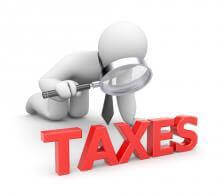Taking Home Office Deductions
Understand the requirements for home office deductions for employees and the self-employed.

Who Can Deduct Home Office Expenses
If you’re fortunate enough to be able to work from home, you may have wondered whether you can take advantage of tax deductions associated with having a home office. Qualified deductions apply to both employees and the self-employed who use any portion of their residence in connection with a trade or business.
Home Office Requirements
Whether you work for yourself or for an employer, your home office must meet some basic requirements to qualify for legal tax deductions. The office must pass one of the following requirements as:
-
Your principal place of business
-
A place you regularly do business such as meeting with clients
-
A storage space for business purposes
-
A daycare facility
-
A rental
If you’re an employee, you must also meet a couple more requirements. As an employee, the business use of your home must be for the convenience of your employer, not for your convenience. And you may not rent any part of your home to your employer for business use.
So if your company provides you with a local office where you accomplish your primary work responsibilities, but you choose to do some work from home in the evenings, your situation wouldn’t qualify. To qualify for home office deductions as an employee, you must perform substantial work activities from home as directed or approved by your employer. Or you must be required by your employer to meet with customers, clients, patients, etc. at your residence on a regular basis.
Your Office Space
The area of your home that you designate and claim for business use is important. You must use a specific room or identifiable space as your office. The only exception to this “exclusive use” rule is when you use part of your home for business storage purposes or as a daycare facility. In these two situations, you can deduct the entire spaces used, even if they are also used for personal purposes.
Figuring the Business Percentage
To figure your deduction for a home office, you must first determine the percentage of your home that’s used for business. This is done by dividing the square footage of the area used for business by the square footage of your entire home. For example, if your home office is 12 feet by 12 feet, that’s 144 square feet. If your entire home is 1,400 square feet, then diving 144 by 1,400 gives you a home office space that’s 10% of your home. Therefore 10% of the qualifying expenses of your home can be attributed to business use and the remaining 90% are personal use.
What Expenses are Deductible
Expenses that have nothing to do with your home office such as remodeling in other parts of your home or the addition of a pool are never deductible. But direct expenses for the areas of your home used for business are 100% deductible. These might include repairs to a home office or installation of a separate telephone line, for example.
Indirect expenses are those for your office that you would incur whether you had a home office or not, such as hazard insurance, utilities, real estate taxes, depreciation, and garbage pick up. These indirect expenses are deductible based on the business percentage of your home, which was 10% in my example. So if your monthly power bill is $200 and 10% of your home qualifies for business use, you can consider $20 of the bill a business expense and the remaining $180 a personal expense.
Figuring the Deduction Amount
You can deduct expenses associated with a home office only up to the amount of income you earn. If your income from the business use of your home is less than your expenses, your deduction for certain home office expenses will be limited. When your qualified deductions are greater than your income, you can carry over the excess to the next tax year.
If you’re performing work from home, be sure to take advantage of its qualified business use. For more details see IRS Publication 587opens PDF file , titled Business Use of Your Home. If you’re an employee, you must itemize deductions on your tax return. There’s a worksheet included in publication 587 to help you figure your qualified home office deductions. If you’re self-employed you must generally report expenses for business use of your home on IRS Form 8829opens PDF file .
Administrative
I’m glad you’re listening. Chi-Ching, that’s all for now, courtesy of Money Girl, your guide to a richer life.
Image courtesy of Shutterstock


